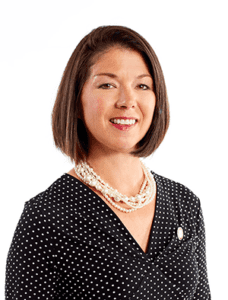Miya Maysent, vice president of talent development and diversity at J.C. Penney, shares her career journey and how she came into L&D.
by Ave Rio
December 5, 2018

vice president of talent development and diversity, J.C. Penney.
What’s been your career path?
Mine might be a little bit different than the traditional — although I don’t know what the traditional path is anymore. My background is all in psychology. I began my education thinking I wanted to be a child psychologist — following in my family’s footsteps. My father was a therapist, so it was sort of like the family business. After completing my bachelor’s degree, the only thing you can do with a bachelor’s degree in psychology is either bartend or go to grad school. So, I did both. I went to grad school and got well into my studies and discovered that I was an absolute horrible therapist. I mean it sincerely — I pity the people I did therapy with. I had a professor who suggested industrial and organizational psychology might be a better fit. I followed that academically and then went into consulting for about 13 years. The foundational consulting was all in leadership selection and also in change management. Then, one of my clients asked if I was interested in starting up an OD [organizational development] function for them — and that led me into more of a corporate role. L&D wasn’t my stock and trade until I got into a corporate role and then we started bundling different pieces together. It was OD first, then it was training and development and talent management.
When your client said, “I’d like you to come into the corporate role,” were you eager to do so? Why did you do it?
Not at all. I was working for a consulting firm, Personnel Decisions International. The client that I was working with was Valero Energy Corp., an oil and gas refining company down in San Antonio. The reason I said no was because I was able to negotiate in the consulting world a three-day workweek. I had two little kids, and I had always had the vision of being a stay-at-home mom and I was getting closer and closer to that when they offered me this position. So I was like, no, I’m good. But what was interesting was that I talked to my boss in the consulting organization and I told him the situation, he said, give it a try because you’re going to learn things being internal that you would never know being a consultant and if you ever decide to come back to consulting, No. 1 — we’ll take you back, and No. 2 — you’ll be a better consultant for having worked internally. I was sort of a reluctant corporate person and my new boss knew that. It was funny because he said to me, “Maybe at a year we check in and see how things are going.” So, at a year, we did, and my response was that I used to think I was really smart as a consultant because people pay you for your opinions, and I didn’t realize just how hard it actually is to execute what seem like brilliant ideas that can come through a very fancy PowerPoint deck and then actually figure out how you’re going to bring that to life inside an organization. The organization’s priorities are never your priorities, so what seems super important — and you’re questioning why it’s taking them so long to get this done — they have a million other things they’re focused on. So, there was no question it made me much wiser. I may have been smarter before, but I was wiser for doing the work inside.
Are there things that you wish you would have known in hindsight before you took on that first corporate role?
One of the things I learned along the way is that when you’re a consultant, you typically have a relationship with leadership. You’re working directly with the leaders themselves. You’re given permission to say certain things. One of the funny things about consulting is consultants tell you what you already know — you’re just paying them so they’ll say it, so you don’t have to or so maybe it’ll be heard if somebody else says it even though you’ve said it before. Coming into a corporate role, I discovered that the thing you get paid to do as a consultant — which is sometimes to hold up the mirror, sometimes to say the hard things — you have to use a different approach when you’re going to live in that house for a while if you want to keep being invited back into certain offices in that house. I had to temper how I thought about my role and I had to adjust my influence strategies. It wasn’t to give up what I knew how to do as a consultant, but it was to layer on a lot of other approaches. In consulting, they were dismissive about backdoor influence strategies, but quite honestly, it’s huge once you’re inside the business.





